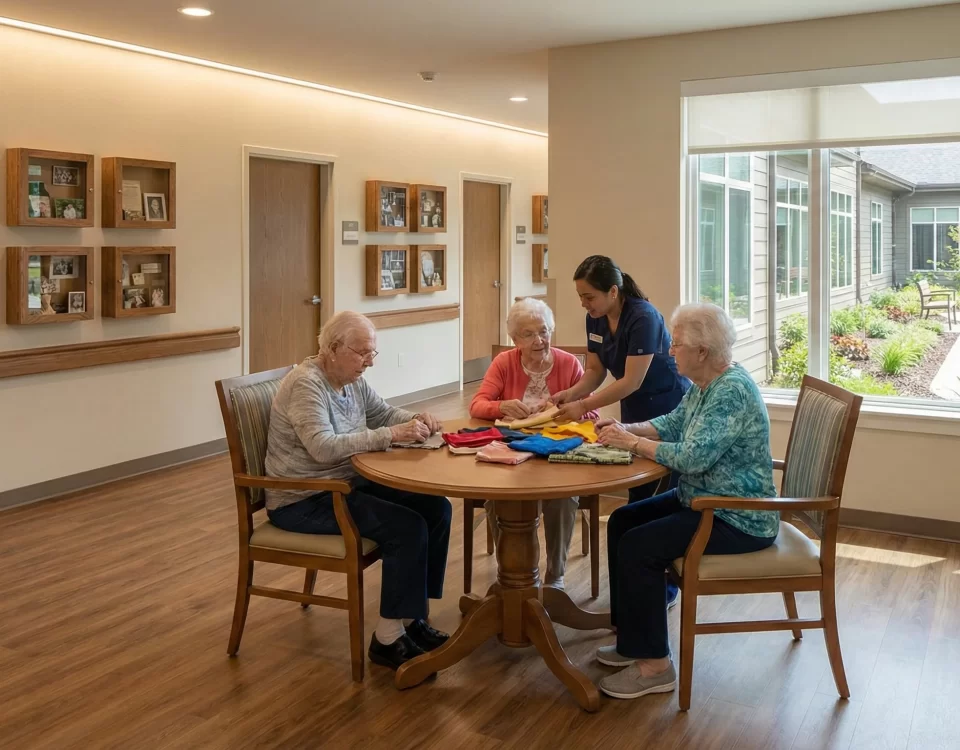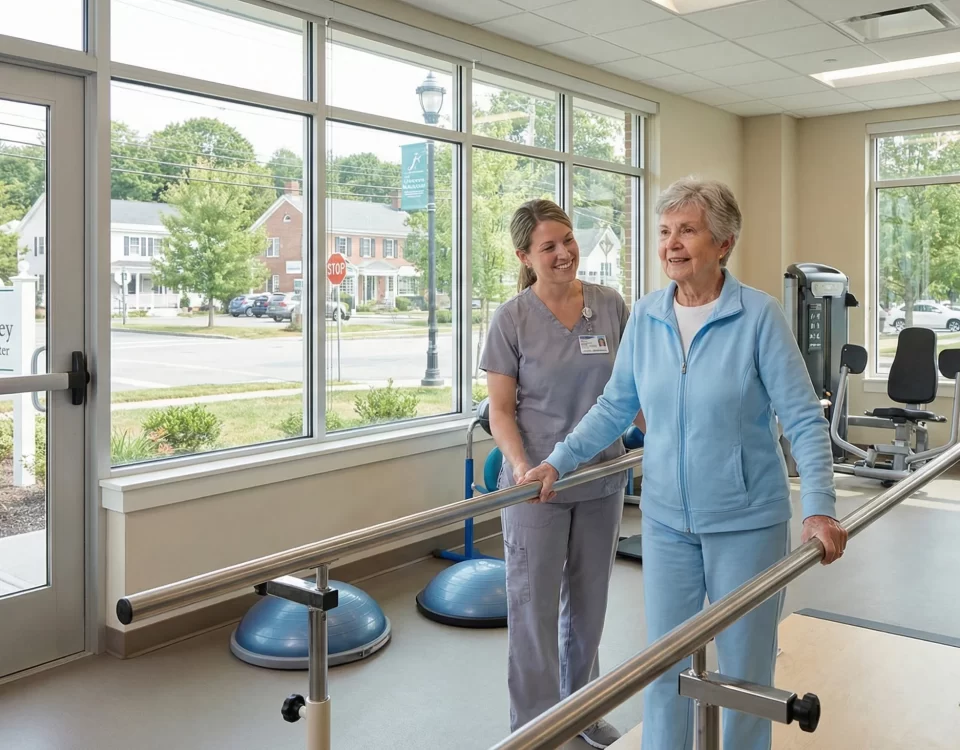
Your Complete Guide to Post-Surgery Rehabilitation Success
July 21, 2025
Top Rehab Centers in New Milford for Post-Surgery Recovery
August 5, 2025Top Rehab For Seniors in New Milford, CT
Recovery after surgery or a medical event becomes more complex with age, but it doesn’t have to be overwhelming. Senior rehabilitation plays a crucial role in helping older adults regain independence, improve mobility, and enhance their overall quality of life. Whether recovering from hip replacement surgery, stroke, or other health challenges, specialized rehab for seniors provides the targeted care needed for successful healing.

Candlewood Valley stands as a premier provider of elderly rehabilitation services in New Milford, Connecticut. With decades of experience serving the local community, this facility understands the unique needs of seniors navigating the recovery process. Their comprehensive approach combines expert medical care with compassionate support, creating an environment where seniors can focus on getting back to the activities they love.
The facility’s reputation stems from its commitment to personalized care and evidence-based treatment methods. Each patient receives individual attention from a multidisciplinary team of healthcare professionals who specialize in senior care. This approach ensures that every aspect of recovery is addressed, from physical healing to emotional well-being.
Understanding the Need for Rehabilitation in Seniors
As we age, our bodies require more time and specialized care to recover from medical procedures and health events. Common conditions that necessitate senior rehab New Milford residents experience include stroke recovery, joint replacement surgeries, cardiac events, and orthopedic procedures. Each of these situations presents unique challenges that require expert intervention.
Post surgery rehab becomes particularly important for seniors because their bodies may not heal as quickly as younger patients. Hip and knee replacements, common among older adults, require extensive physical therapy to restore range of motion and strength. Without proper rehabilitation, seniors risk prolonged recovery times, decreased mobility, and potential complications.
Stroke recovery presents another area where specialized rehabilitation proves essential. Seniors who experience strokes often need comprehensive therapy to regain speech, movement, and cognitive function. The sooner rehabilitation begins, the better the outcomes tend to be. This urgency makes having access to quality elderly rehabilitation services crucial for the New Milford community.
The benefits of specialized rehab programs extend beyond physical recovery. These programs help seniors maintain their independence, reduce the risk of falls, and improve their confidence in daily activities. Mental health benefits also emerge as patients regain function and reconnect with their communities.
Types of Rehabilitation Services Offered
Candlewood Valley provides a comprehensive range of rehabilitation services designed specifically for seniors. Each service addresses different aspects of recovery, ensuring patients receive holistic care throughout their healing journey.
Physical Therapy
Physical therapy forms the cornerstone of most senior rehabilitation programs. Licensed physical therapists work with patients to restore strength, flexibility, and balance through targeted exercises and manual techniques. For seniors recovering from surgery, physical therapy helps reduce pain, prevent complications, and accelerate healing.
After surgery exercise programs are carefully designed to match each patient’s capabilities and medical restrictions. These programs typically begin with gentle movements and gradually progress to more challenging activities. The goal is to restore function while preventing injury or setbacks in the recovery process.
PT surgery protocols at Candlewood Valley follow evidence-based guidelines tailored to each type of procedure. Whether a patient is recovering from joint replacement, cardiac surgery, or other operations, the physical therapy team creates individualized treatment plans that promote optimal healing.
Occupational Therapy
Occupational therapy focuses on helping seniors regain the skills needed for daily living activities. This includes everything from dressing and bathing to cooking and driving. Occupational therapists assess each patient’s home environment and lifestyle needs, then develop strategies to maximize independence.
For seniors recovering from strokes or other neurological conditions, occupational therapy becomes particularly valuable. Therapists work on fine motor skills, cognitive function, and adaptive techniques that help patients navigate daily challenges. This might include learning to use assistive devices or modifying home environments for safety.
The occupational therapy team also addresses workplace concerns for seniors who plan to return to employment. They evaluate job requirements and develop strategies to help patients meet occupational demands safely and effectively.
Speech Therapy
Speech therapy services address communication and swallowing difficulties that may arise from various medical conditions. Seniors who have experienced strokes, brain injuries, or other neurological events often benefit from specialized speech therapy interventions.
Licensed speech-language pathologists work with patients to improve articulation, language comprehension, and cognitive communication skills. They also address swallowing disorders, which can be particularly dangerous for seniors and may lead to aspiration pneumonia if left untreated.
Voice therapy and communication strategies help seniors maintain social connections and quality of life during recovery. These services prove especially important for patients whose conditions affect their ability to interact with family and friends.
Specialized Programs at Candlewood Valley
Candlewood Valley has developed several specialized programs that address the unique needs of seniors in various recovery situations. These programs combine multiple therapy disciplines to provide comprehensive care.
Post-Surgical Rehabilitation Programs
The facility’s post-surgical rehabilitation programs are designed around the most common procedures seniors undergo. Joint replacement rehabilitation focuses on restoring mobility and strength following hip and knee surgeries. These programs typically last several weeks and include both individual and group therapy sessions.
Cardiac rehabilitation programs serve seniors recovering from heart surgery or cardiac events. These programs combine supervised exercise with education about heart-healthy lifestyle changes. Patients learn to monitor their exertion levels while gradually increasing their activity tolerance.
Exercises after surgery are introduced systematically to ensure safety while promoting healing. The therapy team monitors patients closely during exercise sessions, adjusting intensity and duration based on individual progress and medical guidelines.
Neurological Rehabilitation
Seniors recovering from strokes, brain injuries, or other neurological conditions receive specialized care through Candlewood Valley’s neurological rehabilitation program. This multidisciplinary approach combines physical, occupational, and speech therapy to address the complex needs of neurological patients.
Gait training and balance exercises help reduce fall risk, a significant concern for seniors with neurological conditions. Therapists use specialized equipment and techniques to help patients regain confidence in walking and moving safely.
Cognitive rehabilitation addresses thinking and memory challenges that may accompany neurological conditions. Patients work with therapists to develop strategies for managing daily tasks and maintaining independence.
Orthopedic Rehabilitation
The orthopedic rehabilitation program serves seniors recovering from fractures, joint problems, and other musculoskeletal injuries. These programs focus on pain management, mobility restoration, and strength building.
Manual therapy techniques help reduce pain and improve joint mobility. Therapists use hands-on approaches combined with therapeutic exercises to promote healing and restore function. Equipment-based exercises gradually challenge patients while ensuring safety.
Fall prevention education forms an important component of orthopedic rehabilitation. Seniors learn about home safety modifications, proper use of assistive devices, and exercises that improve stability and coordination.
Benefits of Choosing Candlewood Valley
Candlewood Valley’s reputation as a leading provider of elderly rehabilitation services stems from several key advantages that set them apart from other facilities in the region.
Expert Staff and Specialized Training
The facility employs licensed therapists who have extensive experience working with senior populations. Staff members participate in ongoing education to stay current with the latest rehabilitation techniques and senior care best practices. This expertise ensures that patients receive the most effective treatments available.
Interdisciplinary team meetings allow all care providers to coordinate treatment plans and share insights about patient progress. This collaborative approach helps identify potential issues early and ensures that all aspects of recovery are addressed comprehensively.
The nursing staff provides additional support and monitoring throughout the rehabilitation process. Their experience with senior care helps them recognize signs of complications or changes in condition that require medical attention.
State-of-the-Art Facilities and Equipment
Candlewood Valley has invested in modern rehabilitation equipment designed specifically for senior use. This includes specialized exercise machines with safety features, balance training equipment, and assistive technology that supports various therapy goals.
The facility layout considers the needs of seniors, with wide hallways, accessible bathrooms, and comfortable treatment areas. Lighting and flooring are designed to reduce fall risk while creating a welcoming environment for patients and families.
Private and semi-private treatment areas allow for personalized attention while maintaining patient dignity and comfort. The facility also includes spaces for group activities and family meetings, supporting the social aspects of recovery.
Personalized Care Plans
Each patient receives an individualized assessment upon admission, leading to a customized rehabilitation plan that addresses their specific needs and goals. These plans are regularly updated based on progress and changing circumstances.
Family involvement is encouraged throughout the rehabilitation process. Staff members work with family members to ensure they understand the treatment plan and can provide appropriate support at home. Education about home safety and care techniques helps families feel confident about the transition from facility care.
Discharge planning begins early in the rehabilitation process, ensuring smooth transitions back to home or other care settings. The team coordinates with other healthcare providers and community resources to maintain continuity of care.
Preparing for Rehabilitation
Starting a rehabilitation program can feel overwhelming, but proper preparation helps ensure the best possible outcomes. Understanding what to expect and how to prepare can reduce anxiety and improve the rehabilitation experience.
Setting Realistic Goals
Working with the therapy team to establish achievable goals provides direction and motivation throughout the rehabilitation process. Goals should be specific, measurable, and relevant to the patient’s lifestyle and priorities. Regular goal review allows for adjustments as progress occurs.
Short-term goals might focus on basic mobility or pain reduction, while long-term goals address return to specific activities or independence levels. Having both types of goals helps maintain motivation during challenging periods of recovery.
Family members should be involved in goal setting to ensure alignment with home expectations and support systems. This collaboration helps create realistic plans that consider the patient’s living situation and available resources.
Maintaining Motivation
Rehabilitation can be physically and emotionally challenging, making motivation crucial for success. Celebrating small victories and progress milestones helps maintain positive attitudes during difficult periods. The therapy team works to identify motivating factors for each patient.
Staying connected with friends and family during rehabilitation provides emotional support and encouragement. Many facilities welcome visitors during appropriate times and may include family members in certain therapy sessions.
Understanding that recovery takes time and may include setbacks helps patients maintain realistic expectations. The therapy team provides ongoing support and encouragement while helping patients navigate the ups and downs of recovery.
Practical Preparation
Preparing for rehabilitation includes gathering necessary personal items, medications, and medical records. Comfortable clothing that accommodates therapy activities and any medical devices should be packed for facility-based programs.
Arranging transportation to and from therapy sessions is important for outpatient programs. Some facilities provide transportation services or can help coordinate rides for seniors who don’t drive.
Home preparation may include making safety modifications or arranging for assistance with daily tasks during early recovery periods. The occupational therapy team can provide specific recommendations based on individual needs and home environments.
Your Path to Recovery Starts Here
Comprehensive rehabilitation services play a vital role in helping seniors recover from medical procedures and health events while maintaining their independence and quality of life. The specialized programs at Candlewood Valley provide the expert care and support seniors need during their recovery journey.
From post-surgical rehabilitation to neurological recovery programs, Candlewood Valley’s multidisciplinary approach addresses all aspects of senior health and wellness. Their commitment to personalized care ensures that each patient receives the attention and treatment appropriate for their unique situation.
If you or a loved one could benefit from professional rehabilitation services in New Milford, consider exploring what Candlewood Valley has to offer. Contact their admissions team to learn more about their programs and how they can support your recovery goals. Taking the first step toward rehabilitation is an investment in your future health and independence.




